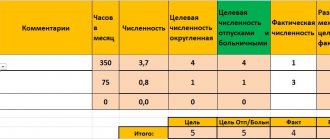Contrary to the popular opinion of some citizens, establishing a disability group does not impose a ban on employment. A disabled person, like other citizens, retains the right to work.
An employer cannot refuse to employ citizens solely because they have a disability. According to the law, a disabled person must be provided with a job taking into account existing health problems and limitations in life activity.
Federal Law of the Russian Federation No. 181 of November 24, 1995 (as amended on July 29, 2018) guarantees feasible employment for citizens with disabilities, taking into account the recommendations of the IPRA. In order to facilitate their employment and organize accessible vocational education, a whole range of measures is provided, which includes:
- establishing a quota for hiring people with disabilities and a minimum number of places for them;
- providing opportunities for entrepreneurship;
- organization of training to master new professions;
- creating a reserve of jobs in professions suitable for people with disabilities;
- creation of necessary working conditions taking into account the recommendations of the IPRA.
This is evidenced by Art. 20 Federal Law of the Russian Federation No. 181. The implementation of the listed measures is carried out in accordance with the procedure determined by the local authorities of the constituent entities of the Russian Federation.
Working conditions that an employer is obliged to create for a disabled worker
Citizens with disabilities have the same labor rights as other employees. But the working conditions of one and the second category of workers differ.
Important! Citizens with disabilities, regardless of where or in what organization they work, are provided with working conditions in accordance with the IPRA.
This is the main legal requirement that all employers must comply with. You cannot ignore the requirements of the IPRA or change them yourself. It is also prohibited to change the working conditions of a disabled person in such a way that they worsen his position in comparison with others, and even more so to prescribe them in collective (labor) agreements.
The legislation provides for a shortened working week, extended basic leave, and additional leave for disabled people. rest and a number of other work privileges.
| Slave. a week | Sick leave payment | Another vacation | Vacation at your own expense |
| 35 hours for disabled people 1st and 2nd grade. | 30 cal. days | 30 cal. days | 60 cal. days |
Reason: Art. 92 Labor Code of the Russian Federation, art. 128 of the Labor Code of the Russian Federation, as well as Art. 23 Federal Law of the Russian Federation No. 181 dated November 24, 1995.
Job quotas
The establishment of quotas is an important point in promoting the employment of people with disabilities. The regulatory measure involves the allocation of a certain number of jobs in private and public organizations for citizens who have difficulty finding employment. The procedure creates conditions for the socialization and rehabilitation of disabled people. Thus, citizens have the opportunity to realize their own skills and potential, as well as provide for themselves financially.
How are available places for employment of disabled people calculated? Quotas are established for enterprises that have more than 100 employees. According to current legislation, such organizations are required to reserve at least 4% of vacancies from the existing list. Here, 2% are young professionals who have just received their education. The remaining 2% of jobs are reserved for people with disabilities. If an enterprise is ready to accept a larger number of disabled people, quotas decrease in relation to young people in a negative direction. Such calculations are carried out by organizations independently.
How are job quotas for people with disabilities implemented? There are no strict requirements regarding the method of employment of persons with disabilities. Such people can be hired by the enterprise:
- According to one's own initiative.
- At the request of the employer.
- Based on the corresponding request from the employment center.
- Thanks to the promotion of special job fairs that search for jobs for people with disabilities.
Work of a disabled person at night, on holidays, weekends and overtime
Working citizens with disabilities are subject to some restrictions on their work schedule.
The law allows people with disabilities to work on holidays, weekends, nights and overtime, but only subject to certain restrictions. First of all, if such work is not contraindicated for a disabled person due to health reasons.
From the letter of the Ministry of Health of the Russian Federation No. 2510/3308-98-32 dated April 10, 1998.
This rule remains unchanged and is currently applied. So, for example, in order to provide a disabled person with work at night or on weekends, the employer must also:
- Notify the disabled person of his right to refuse to work under the specified conditions.
- Obtain written consent from him to work at night (or on weekends).
Important! A disabled person has the right to refuse night, “weekend” (overtime) work. At the same time, the employer does not have the right to reduce his salary for this, as well as fire him or hold him accountable.
Where can a disabled person of the second group work?
It is established that there is currently a list that includes almost 200 specialties. This concerns the organization of work activities for citizens classified as the second category of disability. These include:
- professions of different workers in the production process, for example, stampers;
- office employees;
- those employed at home, including dispatchers;
- scientific and teaching activities.
At the same time, legislative acts do not establish restrictions on what specialty a person with health impairments can choose. In addition, a citizen is not obliged to report his status to the management of the company. This is his right, and he can use it.
It can be concluded that legislative acts do not contain a ban on disabled people working. When applying for a job, it is best to provide the company management with a certificate indicating your health status.
This is necessary in order to be able to enjoy various kinds of preferences. It is also important that the conditions for performing work activities correspond to those prescribed by doctors.
Some types of labor and professional activities from the developed list
Specific professions and positions are recommended for each category of disabled people. As an example, we can cite the following data and characteristics of the work process for citizens with hearing impairment.
| Permissible load character | Form of work | Skill level | Manufacturing industry where you can work |
| Mental (intellectual), physical (lightweight) work | According to established or free schedule; collegially; individually | Availability of knowledge, experience, qualifications, or lack thereof | Housing and communal services, service sector, as well as art. trades or work in small industries. enterprises |
With hearing impairments, people with disabilities can engage in agriculture, scientific, creative work, work in the construction industry, etc. For information, work can be monotonous or dynamic and varied.
Among the positions of employees, the following can be mentioned as an example: lawyer, archivist, bibliographer, semi-qualified accountant, design engineer.
As a rule, all the necessary components of work for each individual citizen with a disability are prescribed in the IPRA.
Second disability group: diseases
What illnesses are the reason for classifying a person as a representative of the category of citizens with disabilities? Among the diseases characteristic of people with disability group 2, the following should be highlighted:
- Serious mental disorders.
- Acute lesions of the cardiovascular system and respiratory system.
- Problems with the reproduction of sounds that were formed against the background of structural lesions of the tissues of the organs of the speech apparatus, as well as as a result of stuttering.
- Disorders of sensory functions, in particular reduced level of vision, lack of tactile sensitivity.
- Physical deformities - disturbances in body proportions, deformation of the limbs or head.
Common mistakes when employing people with disabilities
Error 1. In fact, any citizen with a disability, even in the case of significant limitations in life, can get a feasible job.
If there is a group 3 degree of disability (when the inability to work is most pronounced), the profession is selected for the person individually. At the same time, the motivation to continue the work and its favorable outcome should be clearly expressed.
When selecting, the degree of independence of a disabled person to perform work is taken into account. That is, the need for the participation of third parties, the need for their assistance to a disabled person when performing work.
Error 2. As established, a citizen with a disability has the right to partially (or completely) refuse to comply with the IPRA. In this situation, only the patient’s written refusal is taken into account.
You should know that a refusal issued in accordance with the established procedure removes responsibility from the employer and other services involved in rehabilitation activities for compliance with the requirements of the IPRA.
Error 3. If disability occurs during the period of employment, then the employer is obliged to reconsider the employee’s working conditions. If necessary (taking into account the medical recommendations of the IPRA), he must provide easier work in another profession (position) and, accordingly, all the “labor” benefits due to a disabled person.
Reason for assigning a person 2nd disability group
Only the disability commission can classify a citizen as a person with disabilities of one category or another. In this case, specialists rely on medical history data, and also take into account the violation of certain body functions. Among the main reasons for assigning a second disability group it is worth noting:
- Difficulties with a person performing basic movements, difficulties moving. This also includes the inability to maintain body balance without outside help.
- Serious difficulties when using public transport.
- Impaired spatial orientation, difficulty recognizing familiar surroundings.
- Problems that arise when interacting and communicating with people around you. Difficulties when operating with inanimate objects on a par with others.
- Difficulties related to memorizing or reproducing certain information. Incorrect perception of data, selection of incorrect solutions for processing them.
Answers to frequently asked questions
Question No. 1: How is a disabled person paid for working on holidays and at night?
The payment procedure (its amount) is determined by Art. 154 of the Labor Code of the Russian Federation and government Decree No. 554 of July 22, 2008. For example, for night work (from 10 p.m. to 6 a.m.), an additional payment is required (20% of the tariff rate), which is calculated for each night hour worked.
Question No. 2: What kind of work is allowed for a wheelchair user?
For this category of workers, mental or simple, uncomplicated physical training is recommended. work according to an unregulated schedule. The field of activity can be different: arts and crafts, industry, services, communications.
Recommended types of work include, for example, writing a scientific paper, preparing information and documentation, etc.
What is required to register for the second disability group?
To confirm his special social status, a citizen must receive a referral from his attending physician for a medical examination. The document must include information about the state of health, the severity of certain dysfunctions of the body. The paper also indicates a set of measures taken aimed at rehabilitation. A citizen with disabilities, if desired, can obtain these papers by visiting the bureau that carries out the examination. Local doctors will perform an examination and provide a conclusion confirming or refuting the presence of health problems that correspond to the second group of disability.
Medical contraindications for working as a driver
Can a group 2 disabled person work as a driver? He continues to work when he has no contraindications for his vision:
- blindness;
- poor vision;
- severe myopia;
- pronounced farsightedness;
- disturbance of color perception.
The problems affect one or both eyes.
The reasons for refusal to work as a driver are:
- absence of one lower or upper limb;
- deafness in one ear or two;
- chronic heart and vascular diseases;
- chronic respiratory tract diseases.
After rehabilitation measures, you are allowed to drive a car. A person corrects his vision with glasses or wears a hearing aid. But in such cases the group is not assigned. The general conclusion of the commission is the fundamental fact of the possibility of performing the functions of a driver when working on a vehicle. A subsequent medical examination will reveal positive changes in his physical condition. The second group is removed, and restrictions on the performance of certain types of work are removed. After rehabilitation, the citizen returns to his previous activity: he can drive a car.
Are there any contraindications to the employment of a disabled person?
Is the second disability group working or not? According to legal norms that apply to all citizens without exception, people with disabilities are not prohibited from finding employment. However, there are still a number of contraindications. The latter are determined for each specific person by a special commission - VTEC (medical labor expert commission). Warnings are formed individually, based on existing diseases and functional defects.
At the workplace, specific conditions for working may be created for a disabled person. In this case, the commission (VTEK) is able to oblige the employer to pay for work that is not included in the list of contraindicated actions. If there is an appropriate conclusion, the head of the enterprise does not have the right to refuse employment to a disabled person.
Medical and social examination -{amp}gt;
The essence of your question is generally clear. Let's start with the fact that the issue of establishing disability has not yet been resolved (and there is still no 100% guarantee that the 2nd disability group will be established). Therefore, you seem to be “getting ahead of yourself.” If we assume that the patient will be assigned a 2nd disability group, then he (as a disabled person of any group) will have an IPR developed - which will indicate the types and working conditions that are available to him and those that are contraindicated for health reasons.
We suggest you read: How many people can live in a rented apartment if 2 people are registered there?










